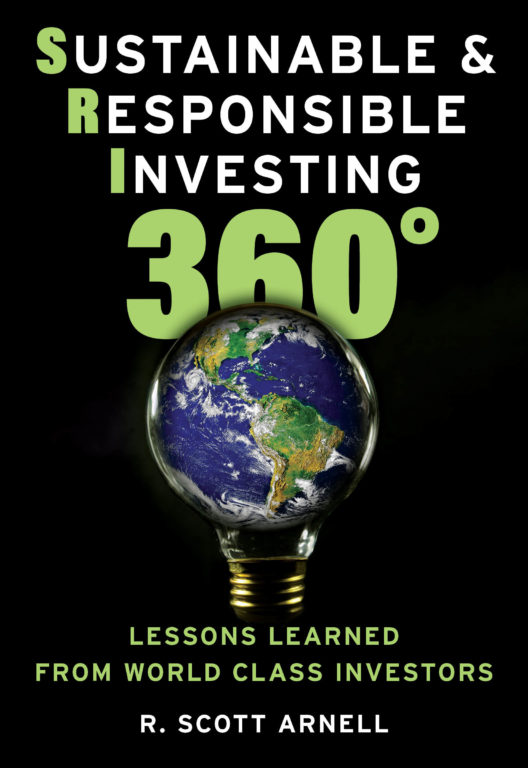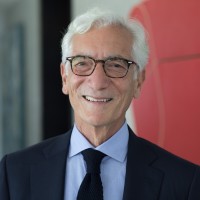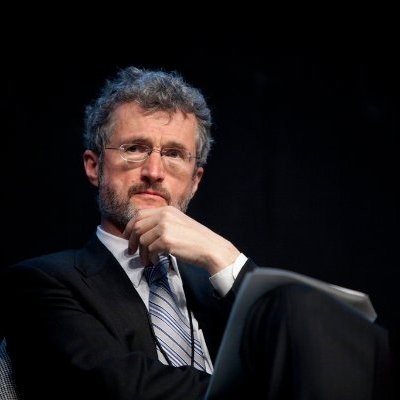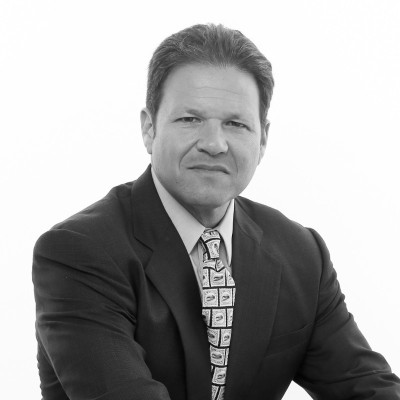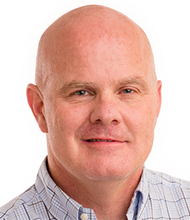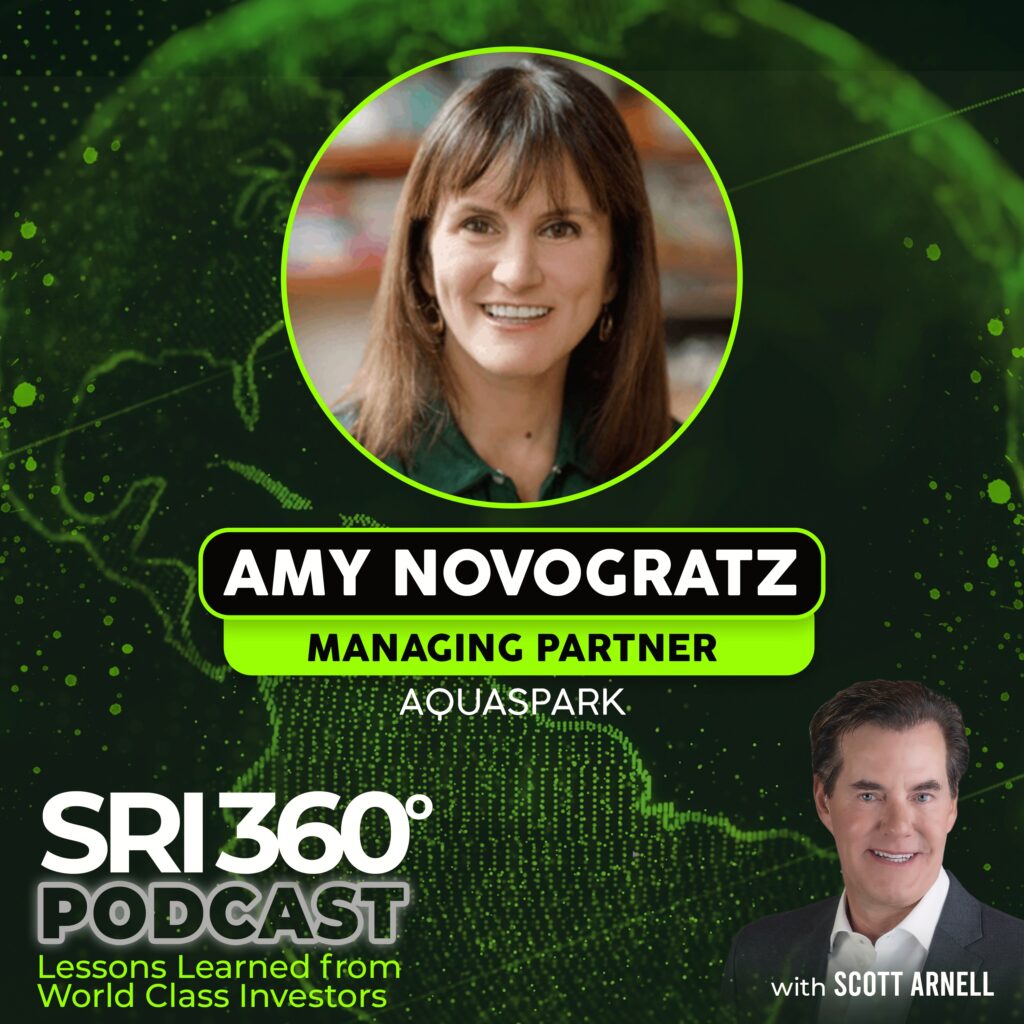
“Over one third of the world currently depend on fish as their major source of protein, and as population and demand for protein grows, we know we can’t get more from the ocean than we currently do. We’re investing in a vision of a future where we have seafood and fish protein on our plate in a way that doesn’t harm our environment.”
— Amy Novogratz
Amy Novogratz is Co-Founder of AquaSpark, a global investment fund based in Utrecht, the Netherlands. AquaSpark is a holding company of innovative, novel solutions to some of aquaculture’s biggest challenges, investing in companies developing a sustainable, optimal food system all along the aquaculture value chain.
Amy’s career as a change agent has focused on building collaborative solutions to some of the world’s most pressing challenges. Her early career highlights include helping set up SPAN, the Social Policy Action Network; developing and producing ‘Chat the Planet’, a web and television entity that bridged young people globally; later she served as Director of the TED Conference’s annual TED Prize for almost a decade, leading more than 20 global collaborations across a broad spectrum of sectors, including healthcare, education, science, technology, conservation, art, and activism.
Notable projects during Amy’s time at TED include: Jamie Oliver’s Food revolution, JR’s Inside Out Project, Bono’s One.org and Sylvia Earle’s Mission Blue. It was on an expedition with marine biologist Sylvia Earle to the Galapagos Islands that Amy met Mike Velings, with whom she developed a shared vision to transform the aquaculture fish farming sector into a more sustainable industry, leading to the launch of AquaSpark – the first global investment fund dedicated to sustainable aquaculture – in 2013.
Amy serves on the boards of eFishery, Energaia, and Xpert Sea.
In today’s episode, we discuss the aquaculture industry and the need for its transition into a more sustainable food supply. A natural-born change agent, Amy recounts her odyssey journey starting out early in her career in activist theater, which she soon felt was too indulgent. She then did an about-face and worked at a series of jobs, first with a think tank, and moving later to co-found the Social Policy Action Network with the objective of impacting culture. This ultimately led to a number of television-related media projects and eventually landing at the TED conferences.
Amy explains the challenges that the sustainable aquaculture sector faces and the increasing role of technology in finding sustainable aquaculture solutions. We discuss Aqua-Spark’s theory of change and the eight components they use to measure their sustainability. She speaks about AquaSpark’s ecosystem approach to portfolio management, how they select their investments, their due diligence process, examples of investments they’ve made and much more.
I really enjoyed my discussion with Amy and I hope you will too.
Listen to the episode on Apple Podcasts, Spotify, Overcast, Podcast Addict, Pocket Casts, Castbox, Google Podcasts, Amazon Music, or on your favorite podcast platform. You can watch the interview on YouTube here.
What was your favorite quote or lesson from this episode? Please let me know in the comments.
SCROLL BELOW FOR LINKS AND SHOW NOTES…
SELECTED LINKS FROM THIS EPISODE:
- Connect with Amy Novogratz: LinkedIn
- AquaSpark
- Chat the Planet
- Credit Suisse
- Go Ventures
- IDH
- Invest Aqua
- Link TV
- Louis Dreyfus Company
- Northstar Ventures
- Rethink
- SPAN (Social Policy Action Network)
- Stichting Doen
- TED Prize
- Temasek
- USAID
- Winrock
SHOW NOTES:
[00:00] Episode introduction
[04:20] We discuss Amy’s degree in Theatre and Literature and how, following her studies, she made a complete change in career direction, working in social policy
[05:05] We hear how Amy set up SPAN (Social Policy Action Network) with Kate Sylvester
[06:05] We discuss Amy’s early career, from working on South African TV show ‘Chat the Planet’, to becoming Director of the TED Prize for more than a decade
[08:08] How Amy met her future business partner, on an expedition to the Galapagos Islands, with marine biologist Sylvia Earle
[09:36] Amy’s role at AquaSpark and how it differs from that of Co-Founder Mike Velings
[10:51] Amy gives us an overview of AquaSpark and their mission
[15:27] We discuss the increasing role of technology in the sustainable aquaculture sector in recent years, and its contribution to sustainable aquaculture solutions
[19:04] We hear about bad practices in the aquaculture sector, in terms of lack of transparency, lack of feed and water pollution
[22:09] We discover what makes ‘sustainable’ fish farming ‘sustainable’, and the eight components AquaSpark uses to measure sustainability and impact
[26:55] We discuss other players in the aquaculture sector and how AquaSpark are one of the only dedicated investment funds for sustainable aquaculture
[30:35] How AquaSpark selects their investments and the due diligence process used
[33:24] Amy tells us about AquaSpark’s ‘Shared Values Manifesto’
[37:03] We hear a real-life example of an investment AquaSpark has made, how it aligns with their company strategy and how successful it is proving to be
[45:59] We discuss why AquaSpark’s 300+ investors choose to invest with them, and the risks that sustainable investing in aquaculture may present in comparison to traditional aquaculture investments
[50:49] The single most important challenge in sustainable VC investing at this time
[51:02] What Amy knows now about sustainable investing that she wishes she had known when she launched AquaSpark
[52:12] Lessons learned from an investment that didn’t go to plan
[54:17] An example of an investment that worked out better than expected
[55:12] Amy shares her advice on how to get into the sustainable VC aquaculture investing space
MORE AMY NOVOGRATZ QUOTES FROM THE INTERVIEW:
“Our oceans are already overfished. Some areas are really depleted. The only way we’re going to meet that demand with fish is through aquaculture, and aquaculture can actually be a really great solution… but we have to do it right. So, AquaSpark’s reason for being is to show that you can do aquaculture right, and it can have returns that are comparable to traditional aquaculture now in order to create a blueprint from which to scale aquaculture. ”
— Amy Novogratz
“If we need to triple aquaculture production in the next two to three decades, the stats say that we actually need eight times more feed than we’re currently producing. ”
— Amy Novogratz
“Look at how much we depend on the ocean for fish and how much we’re damaging the ocean, through how we take and what we take… you start to realize how miraculous it is that the ocean can regenerate itself if you give it space. And, if you look at marine protected areas that are truly protected, they come back with more life than ever before. ”
— Amy Novogratz
“We do a lot to engage our investors… we’re really on this road together and it’s a fun experience. I think that gets lost a lot when we talk about impact and ESG investing. If this is a moment in history, we’re all doing different stuff together… we’re making change, we’re building, we’re using creativity. It’s bonding. It gives you meaning. I think if you ask our investors, most would really say they enjoy being a part of what we’re building. ”
— Amy Novogratz
PEOPLE MENTIONED:



